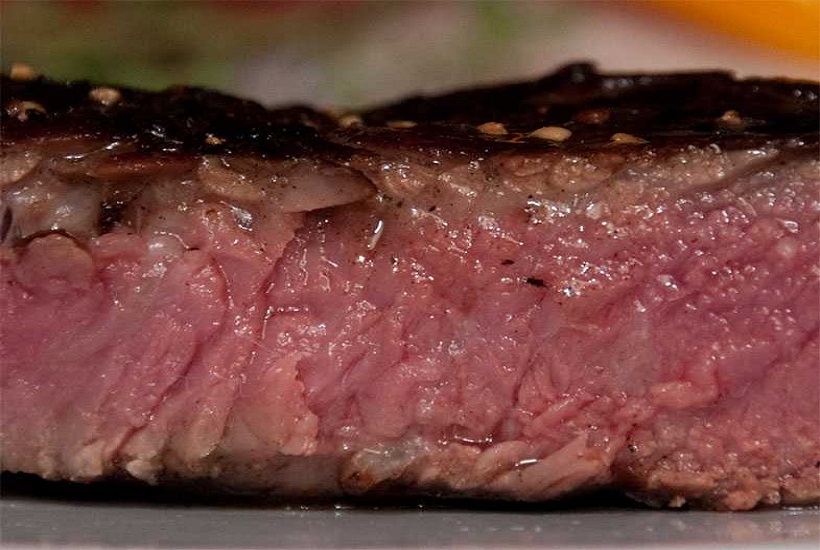Ethical veganism, which is commonly motivated by the minimisation of animal suffering or injury (an ideology which is often linked to the philosophy of ‘cause no injury’, central to Dharmic faiths), and environmental veganism, which is commonly motivated by the minimisation of environmental harm, are both vulnerable to what I call the nihilistic regress objection. In other words, either the argument for veganism fails or it demands much more than just not eating meat: annihilation of all life.
David Benatar has recently formulated an argument about reproductive ethics (antinatalism) that in an important way resembles the core argument in favour of veganism, specifically, he defends the claim that human reproduction is unethical because it is likely to cause suffering for the offspring, and suffering ought to be eliminated: “the one (and only) guaranteed way to prevent all the suffering of their children is not to bring those children into existence in the first place”. Benatar does not make an all-things-considered assessment of the value of self-existence but arbitrarily assumes an ideological stance which takes avoidance of suffering as the highest value. Consequently, it is also susceptible to the nihilistic regress objection.
If the minimisation of suffering is the highest ethical aim, with no discounting for preservation of occasional happiness or other values of the sufferer, then why stop just at not having children to spare them the pain of existence, why not (painlessly) kill yourself and your neighbour as well, out of compassion. Since death is inevitable then painless euthanasia only shifts the instant of death in time, automatically eliminating all the future suffering. On this interpretation causing painless death does not entail causing harm, does not cause more death, but realises the inevitable end at the most favourable time just for the minimisation of suffering.
Granted that antinatalism considers killing as (generally) unethical, it also makes the ethical judgement that within a single generation humanity ought not to exist on account of not reproducing. The nihilistic ideal of exterminating all human life is still there; its realisation is merely deferred to the natural end of everyone who is already alive.
Similarly, if human existence can cause animal suffering and environmental degradation even if we all became vegans, then why stop just at not eating meat rather than try to eliminate suffering and environmental degradation altogether by committing all beings who are capable of suffering or of causing suffering to painless euthanasia? Or should vegans simply adopt Benatar’s antinatalism with respect to animals and prevent their reproduction, thereby eliminating all animal species within a single generation to spare them the pain of existence? Clearly, either the ideology of the minimisation of suffering is logically flawed or the adherents of ethical veganism (and antinatalism) are radically inconsistent in their beliefs.
The ultimate aim of any ideology committed to the minimisation of suffering or environmental harm must be the hypothetically achievable minimum – zero suffering and zero environmental harm. This can be achieved only through non-existence, and not just human non-existence but non-existence of life because all living things suffer as well as cause suffering. An implicit indictment associated with the minimisation of suffering is therefore directed at life itself; life as a principle where nutrients are absorbed from other life-forms and where energy is exchanged with the environment. A consistent interpretation of ethical veganism and antinatalism is, therefore, active nihilism (supervaluation and pursuit of absolute non-existence), what in turn begs the question: who is the minimisation of suffering intended to benefit if no one ought to exist? As I have explained in On What is Right, logical consistency of our reasons for action is a necessary condition of reliably getting what we want out of action. For that reason, an inconsistent schema for solving a problem (such as environmental degradation) cannot result in a reliable practical solution.
I accept that most vegans might not agree that life itself is unethical or that suffering should be prevented at all cost, but that suggests that the minimisation of suffering ideal does not adequately represent their motivation. Many who purport to be ethical vegans are probably more accurately characterised as hedonic-sentimentalist vegans – ‘I oppose meat consumption because it often causes animal suffering which makes me upset’ (sentimentalist motivation), ‘but only as long as this abstention does not in a significant way reduce the quality of my life’ (hedonic caveat) – but unlike the ethical stance, the sentimentalist-hedonic position has no normative force over others; it is purely subjective. Mistaking the non-normative sentimentalist motivation for the normative ethical motivation can easily lead to irreconcilable conflict and therefore to avoidable violence.
Notwithstanding my argument against ethical veganism, there could still be sound normative reasons to avoid eating meat. All I have aimed to demonstrate so far is that the core argument in defence of ethical veganism is either inconsistent or incomplete. There are nonetheless further doubts whether ethical veganism is even hypothetically defensible.
If it is right for predatory animals to kill and consume other animals, because such is their natural inclination, and if Man is a kind of animal, then it is also right for Man to kill and consume animals if such is Man’s natural inclination. The argument in defence of human veganism must then show that it is objectively not natural for humans to kill or consume animals. Considering the history of meat-eating and the difficulty of establishing the objective ‘natural’ choices for a sentient being, I don’t think an argument along these lines could possibly succeed. The most obvious alternative for proponents of ethical veganism would be to show that it is, in fact, wrong for any animal to kill or consume any other animal, which would indict much (if not all) of the ecosystem.
It is true that animals do not have the capacity for rational choice in how they act while humans do, but this fact does nothing to support the claim that killing is wrong just for those who have the rational capacity for choice. It may also not be necessary for us to kill animals, but just because we need not do something does nothing to support the claim that we ought not do something. After all, it is not even necessary for us to exist, let alone do anything. On the other hand, if the entire problem comes down to the question of consent then would it be permissible to kill and eat a consenting human adult? If yes, then ethical veganism fails; if not, then my prior objection applies.
Perhaps some animals are capable of rational thought and even are hypothetically capable of communicating their choices to humans. Could we justifiably eat them if they consented to be eaten? Can we ever be sure that someone is genuinely consenting even if they say they do? A variety of fine points such as these have been examined at length by Michael Martin in “A Critique of Moral Vegetarianism”.
A curious dilemma for ethical veganism is whether there is a moral distinction between killing and letting die a painful but natural death, as is the case of a sick animal. If it is morally right to kill an animal out of compassion then it is unclear why it should not be eaten – after all, it will be eaten either way by other animals or bacteria. A similar example is that of a plague. If there is a rabbit plague, for example, which endangers the ecosystem and therefore the lives of other animals, should we then not kill some rabbits and eat them, if we would so desire? Clearly, eating an animal under these circumstances poses no added liability with respect to causing death or suffering. It is also practically possible to kill painlessly, so the moral implications of causing pain can be dispensed with altogether. All that remains is the case against killing, which I have already addressed and shown that in some cases killing is not necessary (animals die of natural causes), while in other cases killing may be necessary to preserve the entire ecosystem.
There is also a broader, metaphysical justification of killing. By eating what is dead we make it part of our living being, we make it alive again under our identity, and it is quite plausible that by doing so we elevate the killed animals to a higher level of consciousness. On this interpretation death is not an absolutely terminal event but a transition from one living form to another. Eating is reincarnation, signifying the eternal cycle of life and the most intimate bond between all living things. Ultimately, every living thing both consumes living things and becomes food for living things.
The above discussion does not exhaust the logical possibilities of normative reasons not to kill. One possibility is that of interdependence of all instances of agential consciousness combined with supervaluation of self-consciousness, which may entail that preservation of the consciousness of others, or maintaining a particular attitude with respect to other beings of the same kind, is a condition of preserving what we are universally committed to value the most: our own consciousness and the capacity for rational action.
Michael Kowalik runs the Cultural Analysis Blog, where this piece also appears.
Got something to add? Join the discussion and comment below.
Got something to add? Join the discussion and comment below.
Get 10 issues for just $10
Subscribe to The Spectator Australia today for the next 10 magazine issues, plus full online access, for just $10.


























Comments
Don't miss out
Join the conversation with other Spectator Australia readers. Subscribe to leave a comment.
SUBSCRIBEAlready a subscriber? Log in